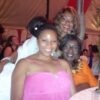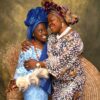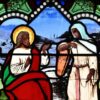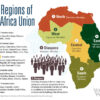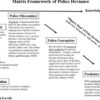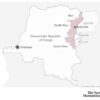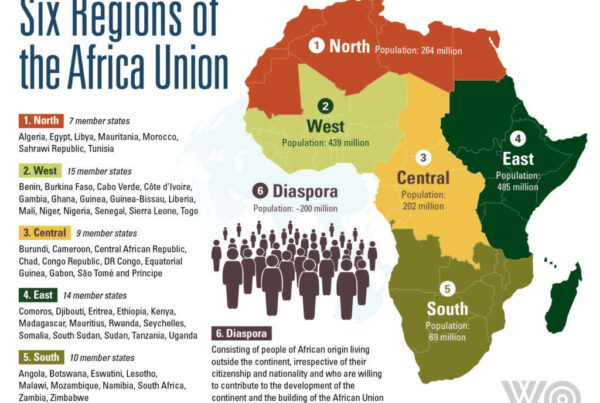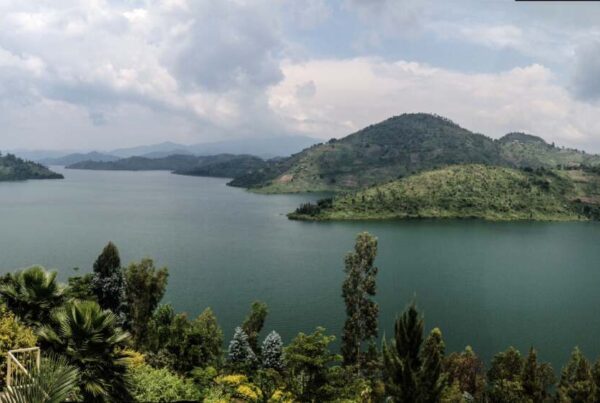Follow
Written by: RJ Adebiyi, ENG101, February 7, 2023
Mum Olimade Adedeji was my Nigerian grandmother. She was not a blood relative; however, mum Adedeji considered my mother, Alyson, her American daughter, so I became mum Adedeji’s grandson. She was loving, elegant, resourceful, well-respected, admired by many, and a woman of strong faith in God. Mum Adedeji was the Administrative Officer for the International Criminal Tribunal for Rwanda (ICTR), the United Nations agency my mother worked from 1999 to 2015 in Kigali, Rwanda, and Arusha, Tanzania. In early 2004, mum Adedeji started a new position as Head of Office for the United Nations Organization Mission in the Democratic Republic of the Congo peacekeeping office (MONUC), based in Kinshasa, the capital.
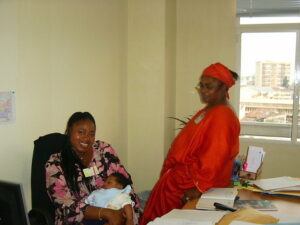
I was three months old when my mother and I took a MONUC flight from Kigali, Rwanda, to Kinshasa, Congo so Mum Adedeji could meet me for the first time in May 2004. My mother said our journey started at the Kigali international airport, stopping in Kisangani, Congo. The plane we boarded in Kigali was an older-modeled passenger and light cargo plane. My mother recalled she was concerned when the plane started the descent to land because she couldn’t see the runway, only a dense forest. We landed safely. During our short layover in Kisangani, my mom was surprised to see female peacekeepers from Uruguay. With confused looks on the peacekeepers’ faces, the female peacekeepers made small talk about motherhood and asked why we were traveling within Congo while the country was experiencing instability. My mother enthusiastically shared, “we are traveling to visit Olamide Adedeji, the Head of Office in Kinshasa.” My mother said she felt seen, independent, empowered, and oddly safe considering the security situation throughout DR Congo. Alas, we were on our way to Kinshasa. The plane that took us from Kisangani to Kinshasa was a modern U.N. mid-size aircraft with flight attendants. Pretty impressive.
Kinshasa
We made it safely to Kinshasa. A driver collected us from the United Nations airport in Kinshasa and took us to the Hotel where mum Adedeji and aunty Dede (mum’s eldest daughter) awaited us. According to my mother, everyone gushed over me. Mum carried me on her back, prayed for us, and gave my mom motherly advice.
Our initial days in Congo were exciting and fun. Kinshasa is busy and loud; there’s much to do and see. Mum Adedeji had a personal cook host several dinners in her suite, introducing us to many visitors. Mum and her guest discussed politics, social issues, and how MONUC expected positive change in DR Congo despite the East’s situation. Our first outing was a tour around Kinshasa. We drove around admiring the crowded cafes and how each café played music encouraging customers to dance in the late morning. Then, on Sunday after church, the driver took us to a lake park, where we ate fresh fish. Back at the Hotel, aunty Dede and my mom walked about the Hotel talking and people-watching. Mom said she was amazed at how confident the Congolese were, adding all Congolese women walk around like supermodels. Then, on Monday, we accompanied aunty Dede to a radio station where she had an on-air interview to discuss her work with East and Central African youth. My mom said one of the highlights was when we visited the MONUC office and met other former ICTR colleagues my mom formerly worked with who are now working in Congo. In addition, mom said she met the UN Under-Secretary-General William Swing, a seasoned American diplomat who oversaw the U.N. Mission in Congo.
Civil Unrest
We spent one week in Kinshasa. Then, on June 6, 2004, we started our journey back to Kigali. Mum Adedeji had a meeting and couldn’t accompany us to the airport. According to my mother, the drive to the airport was different. Kinshasa is busy and full of people, traffic, and street commerce. But that early morning, the streets were quiet, less active, with no women in sight- just pockets of young men. Then, as we pulled into the U.N. airport, mom heard gunfire. Suddenly, a U.N. 4×4 Nissan Patrol sped in behind us with the windows shot out. Even the peacekeepers were surprised because, typically, U.N. peacekeepers never experience personal attacks. According to my mother, she carried me in one arm and had the diaper bag in the other. My mother, driver, and peacekeepers ran into the makeshift U.N. airport lounge to take cover. Once inside, the driver handed mom the telephone. Mum Adedeji was on the other end. She informed my mom that civil disobedience in the East spread to Kinshasa because “dissident soldiers rebelled and captured the South Kivu town of Bukavu from government forces. In the ugliest part of the war, members of government forces and rebels committed war crimes, killing and raping civilians, some of whom were targeted because of their ethnic affiliation and MONUC’s inability to protect civilians in Eastern Congo. As a result, mum added, the Congolese government canceled all U.N. and commercial flights. She reassured my mom that the driver would drive us back to the Hotel.
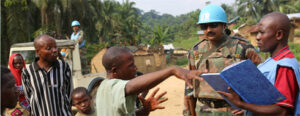
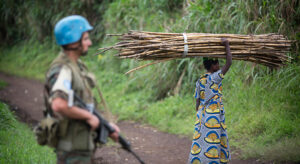
Driving through street barricades to reach safety
According to my mother, the driver was on the phone, speaking in French and Lingala (a local Congolese language), trying to ascertain the safest route back to the Hotel. Then, a European Union (E.U.) driver suddenly removed the E.U. sticker from the sides of his 4×4 vehicle and told us that he would drive us back to the Hotel with the E.U. worker. Mum’s driver stayed behind with the U.N. vehicle.
As the driver drove us back to the Hotel, he was cautious and went slow. My mother recalled holding me tight and praying as she saw tires burning in the middle of the road. Young men stopped vehicles and yelled in foreign languages, waving sticks and machetes in the air. The people in the streets were chanting for the United Nations to leave Congo. We got back to the Hotel safely and met up with aunty Dede. Mum was still at the office attending to the crisis unfolding in Kinshasa.
The next day, the streets were full of male and female protesters. A mob had attacked the MONUC office, burning U.N. cars and trucks and throwing rocks through office windows. Chaos! All embassies, non-governmental organizations, government offices, and most businesses were closed.
On the hunt for milk and diapers
My mother only expected to spend one week in Congo, and unfortunately, she ran out of baby formula and diapers. Although my dad, Robert, who also worked for MONUC as an Administrative Officer but stationed in Goma, purchased and sent baby formula via bus to Kinshasa, my mom couldn’t wait. The Hotel’s general manager instructed all guests to remain in the Hotel. Aunty Dede and my mom watched all the chaos overwhelming the streets of Kinshasa from the hotel balcony. My mother contacted the U.S. embassy to register us if the U.S. government evacuated U.S. citizens. She also had to find a way to get me formula and diapers. My mother went against security protocol, left me in the Hotel with aunty Dede and went out to buy baby formula so I could eat. She jumped into a taxi and informed the driver, in her broken French, that she had a 3-month-old baby that needed milk.
The taxi driver drove around, but all shops were closed. My mother noticed a security guard in front of a shop. She told the taxi driver to ask the guard if any shops were open. The guard saw the driver and my mom looking at him, and he waved us over. The driver spoke to the security guard. Immediately, the guard guided my mom to the back of the building and into a door. My mom said she was frightened because she couldn’t understand what the security guard said. But to her surprise, there were other expatriates in the store shopping. She quickly grabbed formula and diapers and returned to the Hotel safely. However, my mom opened the diapers, which were Size 4, extra-large. She and aunty Dede laughed.
Heading back to Kigali
After another week of being stranded in DR Congo, things had calmed down. Banks, shops, and businesses reopened, and commercial flights resumed. My dad, Robert, purchased our flight tickets back to Kigali. Mom and aunty Dede had the driver take them to the bank to get money. They were taken to a back office on the second floor to get cash off mom’s credit card. Mom said she was amazed to see two young ladies in a bank office counting high stacks and stacks of U.S. $100 notes, unguarded. Finally, mom was able to get money and prepared to depart. Mom and I left DR Congo on a Kenya Airways flight, stopping in Nairobi, Kenya, and finally landed in Kigali. Mum Adedeji briefed Remi Abdulrahman, the UN ICTR Chief of Security, of our travel plans, and Chief Remi had security personnel pick us up from the Kigali airport. ICTR Kigali officers drove us to our home. They humorously told my mom that she had no business traveling to Congo with a baby and how blessed we were to escape unharmed—my grandmother Olivia, who was visiting from Cincinnati, Ohio, and my nanny were happy to see us. My grandma Olivia prayed and was amazed and thankful we returned safely.
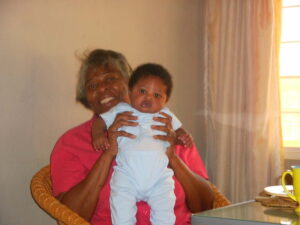
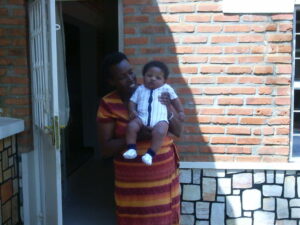
From time to time, my mother would talk about our Congo trip and say she was hopeful that I would be motivated to follow in my dad’s footsteps and work as a diplomat or an administrator in peacekeeping. Unfortunately, however, I can say that the motivation hasn’t arrived!
The Democratic Republic of Congo, Events of 2004: https://www.hrw.org/world-report/2005/country-chapters/democratic-republic-congo
‘Coup attempt’ rocks Congolese capital: https://www.theguardian.com/world/2004/jun/11/congo












